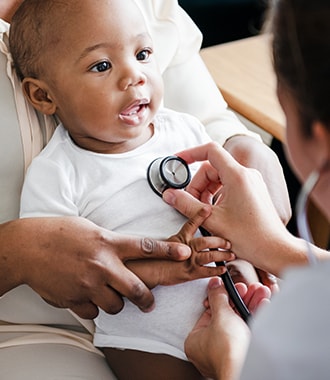Health
Acid reflux in babies: What you need to know
By Jenilee Matz, MPH Mar 07, 2025 • 6 min
If your baby spits up, you’re not alone. In fact, about half of babies spit up several times per day during the first three months of their lives. This is called gastroesophageal reflux or acid reflux. In most cases, reflux isn’t harmful and resolves on its own by the time your baby is around 12 months old. If your baby has other symptoms in addition to reflux, they may have a more serious, but treatable, health issue.
Why acid reflux in babies occurs
In infants with reflux, the lower esophageal sphincter (a muscle at the end of the esophagus that acts like a valve) hasn’t fully developed. Normally, this valve only opens when you swallow, allowing food to pass through the esophagus to the stomach. It stays closed at other times. In babies with reflux, the valve isn’t mature, and it allows stomach contents to come back up the esophagus, causing your baby to spit up. Lying flat most of the time, having a liquid diet, and being born early may also contribute to reflux in babies. Once the valve is fully formed, your baby should stop spitting up.
Acid reflux often starts when a baby is between two to three weeks old, and it tends to peak around four to five months. Once a baby starts sitting up and eating solid foods, reflux may improve.
Symptoms of reflux
Most episodes of spitting up in infants are brief and do not come with other symptoms. Spit up is defined as the easy flow of contents out of the mouth, often with a burp. It isn’t uncommon for babies to spit up several times per day. In general, as long as your baby is healthy, happy and gaining weight, reflux is not a concern. In fact, these babies are often referred to as “happy spitters” because reflux doesn’t seem to bother them.
Signs of more serious conditions
Spitting up can sometimes be a sign of a more serious health problem, such as gastroesophageal reflux disease (GERD). GERD is characterized by acid reflux that lasts longer and may interfere with a baby’s feeding or cause damage to the lining of the esophagus. Contact your child’s pediatrician if they have any signs of GERD, such as:
- Crying or arching their back during or right after feedings, or acting like they’re in pain
- Irritability after eating
- Refusing to eat or poor feedings
- Gagging or trouble swallowing
- Wheezing or trouble breathing
- Coughing
- Poor weight gain or weight loss
- Frequent or forceful vomiting that causes stomach contents to shoot out of their mouth
The symptoms of GERD may resemble other conditions or medical problems. You should also contact your child’s pediatrician if they start spitting up after six months of age, have blood in their stool, or spit up green or yellow fluid or fluid that looks like coffee grounds.
How to manage infant reflux
Even though most babies outgrow reflux by their first birthdays, the following tips may help reduce spitting up in some cases:
- Burp your baby well. If you’re breastfeeding, burp your baby after nursing from each breast. If you’re bottle-feeding, burp your baby after every one to two ounces of formula or breast milk.
- Hold your baby upright after feedings. Aim to hold your baby upright for 20–30 minutes after eating, and postpone active play or tummy time until later. Always place your baby on their back for sleep, even if they have reflux.
- Do not overfeed your baby. Talk to your child’s pediatrician about how much and how often to feed your baby. They may recommend smaller, more frequent feedings.
- Continue breastfeeding. If you are breastfeeding your baby, continue to do so. Some studies show that breastfeeding protects against reflux.
- Avoid exposing your baby to tobacco smoke. Being around smoke can make acid reflux worse and cause other health problems in babies.
Your child’s pediatrician may also recommend adding a small amount of oatmeal cereal to your baby’s bottle to thicken their feedings. Or if they suspect your baby has a food allergy or sensitivity, they may suggest changing formulas if your baby is formula-fed. Do not add cereal to your baby’s bottle or switch formulas without talking to their pediatrician first.
Note that these lifestyle changes are recommended as a first-line treatment for acid reflux and GERD. However, if GERD is severe, treatment may include medications or even surgery.
Rest assured that acid reflux is normal in healthy infants. However, if you’re concerned about your baby’s symptoms, talk to their pediatrician. They can let you know if your child is a “happy spitter” or if there is another issue.
Updated by Amy Magill, MA, RDN, March 2025.
Sources:
- https://medlineplus.gov/refluxininfants.html/
- https://www.uptodate.com/contents/gastroesophageal-reflux-in-infants
- https://www.healthychildren.org/English/health-issues/conditions/abdominal/Pages/GERD-Reflux.aspx
- https://www.healthychildren.org/English/ages-stages/baby/feeding-nutrition/Pages/Why-Babies-Spit-Up.aspx
- https://www.mayoclinic.org/diseases-conditions/infant-acid-reflux/symptoms-causes/syc-20351408




